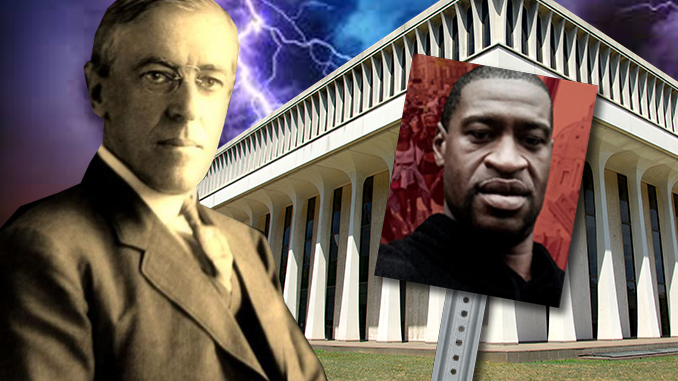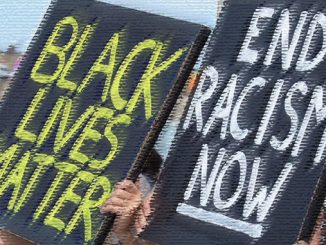
By S.T. Patrick
In 1948 Arthur Schlesinger Sr. of Harvard administered what is known as the first presidential performance survey. President Woodrow Wilson ranked as the fourth-greatest U.S. president, according to the historians surveyed by Schlesinger. Seventy-two years and countless surveys later—though we may disagree—Wilson still consistently ranks between sixth and eleventh. However, the image of the intellectual, diplomatic president has now taken a hit, as Princeton University has decided to remove Wilson’s name from its public policy school due to his “racist thinking and policies.”
Colin Woodward of the “Talking Points Memo” website wrote, “Son of the Confederacy’s leading cleric, apologist for the Klan, friend of the country’s most prominent racist demagogues, and architect and defender of an apartheid international racial order, the amazing thing is that Wilson’s name was ever associated with idealism or respectable statesmanship.”
Wilson earned his undergraduate degree at Princeton. He returned to his alma mater as a professor, a position he held for 12 years before becoming the university’s president. Now, he has been cancelled. The school has been renamed the Princeton School of Public and International Affairs, and the former residential Woodrow Wilson College has been renamed First College.
A statement released by Princeton’s board of trustees explained, “We have taken this extraordinary step because we believe that Wilson’s racist thinking and policies make him an inappropriate namesake for a school whose scholars, students, and alumni must be firmly committed to combatting the scourge of racism in all its forms.”
Wilson’s father, Joseph Ruggles Wilson, was known for a popular sermon he had distributed throughout the Confederacy, a sermon that argued for the Biblical sanction of slavery. When young Woodrow was admitted to Princeton, it was a school (unlike other Ivy League institutions) that refused to admit blacks as students. After graduating from Princeton, Wilson wrote an article arguing that Southern whites must maintain “united resistance to the domination of an ignorant race.” The Wilsons were then living in Georgia.
Wilson said that allowing blacks the right to vote would be a “carnival of public crime.” He said the Ku Klux Klan was formed “for the mere pleasure of association [and] private amusement,” and he said that Chinese men were “hardly fellow men at all, but evil spirits.”

As president, Wilson reversed the desegregation that was happening within government offices. Blacks were assigned to certain bathrooms and were told that they had to eat their meals there, too, so that they did not dirty the white lunchrooms. When the white head of the NAACP complained about the widespread stiffening of race policy within government offices, Wilson told him that the changes were being made “in the interest of the Negroes.”
Wilson is lauded most for his failed internationalist idea, the League of Nations. But even it was flawed in the same way that his policies on race were flawed. Wilson’s famed “idealism” meant that Anglo-Saxon settled states like the U.S. and Canada should have self-determination. Populations with an Anglo-Saxon base should also have their own nation states (Romanians and Czechs, for example). He did not think Indian, Arab, African, or Pacific Island populations should receive the same level of nationhood and self-determination. They were to be at the bottom of an international racial hierarchy created by the League. When Japan introduced an addendum that would have ensured racial equality across League member nations, Wilson nixed it. He didn’t want non-white citizens or guests to be treated equally in public spaces within the Jim Crow South.
“It’s said that the South lost the war, but won the peace,” Woodward wrote. “But it was Wilson’s presidency that sealed the victory.”
This is quite the historical conundrum for the mainstream left that wants to embrace “Generation Cancel.” They have for decades taken delight in decrying the racial views of former Republican senators such as Strom Thurmond and Jesse Helms, yet they have ignored the sins of Wilson, and they have cried “redeemed” when it came to West Virginia’s former Sen. Robert Byrd, who was the top officer in his local Ku Klux Klan. Frankly, it can be argued that sacrificing American boys on the front lines of World War I was a greater sin than racism, but in 2020, war is still largely accepted and fashioned as patriotic, while racism is atop the sins deemed socially, politically, and professionally unforgiveable. In the year of historical cancellations, when statues have fallen and history has gone under the anesthetic of erasure, Wilson is just the next old, white man in line.
S.T. Patrick holds degrees in both journalism and social studies education. He spent 10 years as an educator and now hosts the “Midnight Writer News Show.” His email is [email protected]. He is also an occasional contributor to TBR history magazine and the current managing editor of Deep Truth Journal (DTJ), a new conspiracy-focused publication available from the AFP Online Store.





